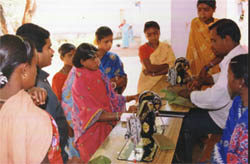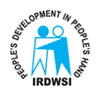RURAL SKILLS / TECHNOLOGY TRAINING & UNIT
Driving Training Programme
The project as envisaged started a technical training driving com mechanism programme for the people displaced villagers of national aluminium company complex (NALCO) in the first batch (1982) 10 persons were selected from the displaces villages and imparted training. The instructor has to take special efforts to train the village people in this trade of technical knowledge, as they have no basic education to rely on.
In 1989, one more person was deployed as a driving training instructor and a jeep was maintained for this purpose. in the future the driving training school with little more training facilities will be established.
Typing
In cooperation with NALCO (who was in need of secretaries) a typing course started functioning at Jeypore in 1982. Initially two typewriters were brought for training the students in typewriting. Average 20 students can be trained in one course in a period of 46 months. Two bathes are trained annually. As of 1984 two batches of 44 students underwent training in typewriting During six months in 1985 the programme was suspended for many reasons, and was taken up again by the youths of JELC (an association called LIBERATION) with 22 new pupils.
Tailoring Unit Programme
A small amount was given to the tailors through JELC, to but a new machine as they previously rented the machines on a high amount of rent. on repayment another tailor was given a machine. Meanwhile, they were also approaching the cooperative credit bank for loan. The training is for a period of six months and 12 trainees were in 1990 undergoing this course. after eight years of running the programme 95 pupils were trained in tailoring and 19 of these pupils got assistance.
Diary Programme
In may 1983, two candidates were selected for from each of the 15 villages who were landless, bonded labourers and marginal farmers. The training programme was arranged with the help of central cattle breeding farm, Sunabeda. This training programme was planned so that the trainees after completion would be confident enough to start a small dairy in their own village with assistance from government.
Poultry Production Programme
This programme also benefits the landless and marginal farmers. A poultry distribution and breeding centre was established in 1986 at similitude.
Weaving Training
A weaving training programme was established in 1984 to help the already trained weavers to renew the skill they were able to produce dhotis, towels, saris etc for the local consumption. As of 1984 five families were involved in the programme.
Pottery Unit Programme
20 families in the village of Gotijodi were traditional pot makers assisted by the government. These families were handicapped during rainy season, and on the initiative of the village, WIDA agreed on building a pottery community shed so the skilled people can do their work even during rainy season.
Tailoring Training Programme
This programme was proposed on the request of the women at jetport in 1986. The poor women are motivated to undertake training on tailoring so that they can be self employed. 18 women were enrolled in the first batch for this training primmer in 1986.
Potato Seed Distribution
Keeping in view the analysis of the agricultural practice in the villages, WIDA imitated the farmer from five village in 1986 to undertake summer cultivation and introduce potato farming. Nearly 75 farmers received potato seeds and got involved in potato cultivation.
Carpentry Training
Seven women from four different village underwent training in carpentry in 1988 and received basic tools for carpentry work from the project.
Bamboo Basket Training
Nine women from tree different village underwent training gin bamboo basket making in 1988. The trained women are motivated to approach bank and government institutions for loan. Two women have, in 1989, already received assistance from the government financial intuition.
Brick Making Training
20 people were trained in brick making in 1989, while a housing programme was under construction in a village.
Bee-Keeping Programme
In 1990, a bee-keeping programme was implemented and trained 18 women from 8 villages.
This programme is sponsored by the district rural development agency, state govt. of Orissa. During 1994, one batch of bee keeping training was organized. totally 12 trainees from 6 villages were admitted during 30 days. after training they were assisted with bee boxes.
Rope Making Programme
12 women from 3 villages was in the year of 1990 trained in rope making.
Soap Making Training
In 1989, 15 women from 4 villages were exposed to soap making training. year another 12 women from 2 villages were trained in soap making. in 1994 5 trainees from 2 villages were exposed to the progrmame for a period of 10 days. They all belonged to schedule tribes and were all men. after the training they were assisted with tool kits to start production.
Sisal-Crat Training
In sisal cart training, 3 duality women from one village were trained in 1993, they were trained in rope making by 2 ply machine, thick rope door mats hub flower and pot hanger making, de-husking, glass cover making etc. they all completed a three months course.
The bonda tribes were trainee is sisal craft making in 1995. totally 22 of them underwent training. In the morning session the bondas were attending literacy classes and after lunch they were imparted sisal and other skill training. The duration of the training was for 8 months.
Lacquer Skills Training
The native skill of using raw lack to make different things is slowly disappearing with the help of highly skilled artisan the project started the skills training on lack in 1993, 8 tribal women from 3 villages underwent a six month training on lack based artisan products.
Hill Broom Making
In 1993 we 12 women from 2 villages underwent training in hill broom making, 2 hill broom units were established. During 1994, 2 batches of broom making training was organized, a total of 11 trainees from 2 villages during 10 days.
After training, the trainees were assisted with tool kits to start production. This programme is sponsored by DUST.
In 1999 one hill broom unties was followed up in diehard pinhead, 12 members were formed a group in the village to run the unit and they were trained by a local instructor
Leaf-Plate Making Training
 In leaf plate making initially 39 trainees war trainees in 4 batches in 1995. They all came from 5 villages. 38 women and 11 men were trained during 5 days. They were trained in leaf sorting, leaf stitching, ammo stripes, plate making by use of machine, changing and fitting to die in the machine, connection of electric wires etc. They were trained on using the sale and said leaves. After training they are making leaf-plates and selling in the market.
In leaf plate making initially 39 trainees war trainees in 4 batches in 1995. They all came from 5 villages. 38 women and 11 men were trained during 5 days. They were trained in leaf sorting, leaf stitching, ammo stripes, plate making by use of machine, changing and fitting to die in the machine, connection of electric wires etc. They were trained on using the sale and said leaves. After training they are making leaf-plates and selling in the market.
Batik Prints Training
One batch of Batik print training was organized by WIDE. a total of 9 trainees from 3 village underwent training for 10 days where they learnt about the various methods of printing and dyeing of cloth in batik.
Food Processing
In 1998, one food processing unit was started in a village with the involvement of 10 women. The women are processing the spice power out of turmeric, chilli, tamarind de seeding etc.
Masonry Training
One batch of mason training was organized in the month of September 1997. This programme was also organized for the youths of the villages were housing programmes was proposed. Total 10 trainees from 5 villages underwent the training. All the trainees belong to ST communities.
Electrician (House Wiring) Training
Villagers of the Mini Hydro project selected 2 youth from the village to look after and later to take care of the whole project. The selected trainees were trained in house wiring at reject. The duration of the training was for 30 days. They underwent training in house wiring an repair of worn out and faulty equipment.
Computer Training
A computer centre was set up in similitude to train local youth in computer courses booth short term and long term certificate courses.
With their own interest and by good guidelines from the well trained core faculties students towards the computer technology.

